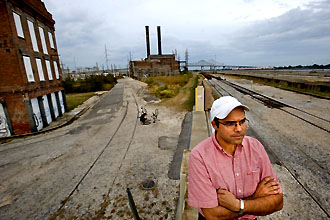Abraham Lincoln's Transformative Journeys
Tulane University geographer Richard Campanella posits that two trips from the Midwest to New Orleans helped an ordinary young Westerner, Abraham Lincoln, become the man he was as president of the United States.

Geographer Richard Campanella, associate director of the Tulane/Xavier Center for Bioenvironmental Health, surveys the point on the Mississippi River where he believes Abraham Lincoln landed his flatboat in New Orleans. (Photo by Paula Burch-Celentano)
His new book, Lincoln in New Orleans: the 1828â“1831 Flatboat Voyages and Their Place in History, reconstructs two trips Lincoln made as a teenager and at 22, guiding a flatboat loaded with preserved pork and corn down the Mississippi River from Indiana and Illinois.
“I would argue that New Orleans its economy, its infrastructure, its views on race, its handling of slavery and slave-trading, and its multicultural and multi-lingual population exposed Lincoln to extraordinary circumstances that affected his intellectual development in historically significant ways,” Campanella says.
In ways similar to a mythological hero's journey, he says, these trips “had a transformative impact on his philosophical development.”
It was in New Orleans that the impressionable Lincoln witnessed large-scale slave-trading for the first time. The two voyages, which after three years of research Campanella can for the first time pin down to specific dates and locations, formed the two longest journeys of Lincoln's life and his only visits to the Deep South. Lincoln also nearly lost his life in Louisiana, in a violent attack the night before he first set foot in New Orleans.
Campanella, research professor and associate director of the Tulane/Xavier Center for Bioenvironmental Research, says he has been fascinated by New Orleans for decades. He is the author of Geographies of New Orleans: Urban Fabrics Before the Storm, Bienville's Dilemma: A Historical Geography of New Orleans and other books.
Campanella will give a lecture at a book-signing event on Tuesday (Nov. 9) at 6:30 p.m. at the Historic New Orleans Collection, along with law professor Oliver Houck, author of Down on the Batture. The event is free and open to the public.
